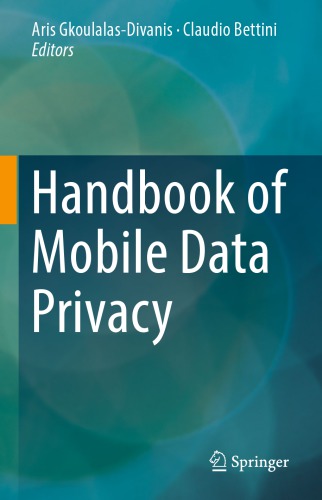Product desciption
Handbook Of Mobile Data Privacy Aris Gkoulalasdivanis by Aris Gkoulalas-divanis 9783319981604, 3319981609 instant download after payment.
This handbook covers the fundamental principles and theory, and the state-of-the-art research, systems and applications, in the area of mobility data privacy. It is primarily addressed to computer science and statistics researchers and educators, who are interested in topics related to mobility privacy. This handbook will also be valuable to industry developers, as it explains the state-of-the-art algorithms for offering privacy. By discussing a wide range of privacy techniques, providing in-depth coverage of the most important ones, and highlighting promising avenues for future research, this handbook also aims at attracting computer science and statistics students to this interesting field of research. The advances in mobile devices and positioning technologies, together with the progress in spatiotemporal database research, have made possible the tracking of mobile devices (and their human companions) at very high accuracy, while supporting the efficient storage of mobility data in data warehouses, which this handbook illustrates. This has provided the means to collect, store and process mobility data of an unprecedented quantity, quality and timeliness. As ubiquitous computing pervades our society, user mobility data represents a very useful but also extremely sensitive source of information. On one hand, the movement traces that are left behind by the mobile devices of the users can be very useful in a wide spectrum of applications such as urban planning, traffic engineering, and environmental pollution management. On the other hand, the disclosure of mobility data to third parties may severely jeopardize the privacy of the users whose movement is recorded, leading to abuse scenarios such as user tailing and profiling. A significant amount of research work has been conducted in the last 15 years in the area of mobility data privacy and important research directions, such as privacy-preserving mobility data management, privacy in location sensing technologies and location-based services, privacy in vehicular communication networks, privacy in location-based social networks, privacy in participatory sensing systems which this handbook addresses.. This handbook also identifies important privacy gaps in the use of mobility data and has resulted to the adoption of international laws for location privacy protection (e.g., in EU, US, Canada, Australia, New Zealand, Japan, Singapore), as well as to a large number of interesting technologies for privacy-protecting mobility data, some of which have been made available through open-source systems and featured in real-world applications.


